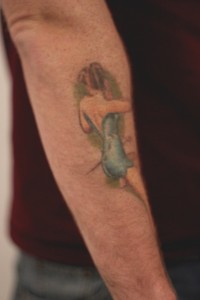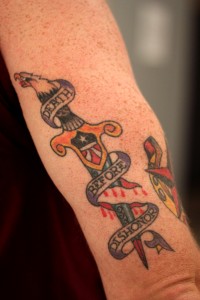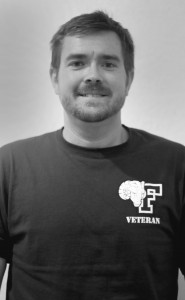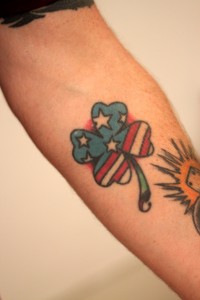CAMOUFLAGED: William Deighan, Part II

February 25, 2013
In the final segment of the Observer’s miniseries, “Camouflaged,” we talk to William Deighan, Fordham College, Rose Hill (FCRH ’15), and former E-4 Senior Airman in the U.S. Air Force whose responsibility as an aircraft structural maintainer led him from the shores of the Arab state, Oman, to confidential counter-drug missions in the skies of Ecuador. In Part II of William’s story, he reveals just how secret his missions were, his adjustment from a plane to a classroom and his various military tattoos. To William, and to all veterans of wars past and present, we greatly appreciate the bravery and sacrifice you have dedicated yourselves to in the pursuit of freedom and security.
The Mission
[The plane’s roles] were observance and I’ll kind of cut it at that because I don’t know what the secretiveness of that is if it’s out yet. I was the mechanic for the plane and then there would be a crew of intel people in the back. At times I would be on the plane; it was up to the captain to request a mechanic or the crew chief could as well. He’s in charge of the entire plane. If they knew they were staying overnight they might bring us with them.
Wounds or injuries
No wounds or injuries. My ears are probably blown out because of the jet engines (laughs). I knocked myself out once on the wing of the plane but that’s about it (laughs).
Going from the military to classroom
It’s interesting. My story for Fordham is probably one of the longest out there. I came back in the 2004 and I think I came back [to school] in 2005. At the time I was working for Bear Stearns. I found out they had a Work For School program so I wrote a letter to my former Deans, told them I was in the military and changed myself, I have a lot more focus and that I could come back to school.
They said, ‘Oh great. Come back and we’ll sign you up.’ So I started with the Montgomery GI bill which I signed up for. I came back and I was doing excellent and then Bear Stearns took it’s turn for the worse which sucked, but you do what you can. That left me without a job and without a real position of what I’m going to do. There I was again in the Dean’s office after two semesters trying to figure out my life. I needed a job. Now in hindsight I probably should of just lived off the G.I. Bill and kept going here. But when you feel like you’re losing a job you get so nervous about everything you just need to find the job. So I found one in Con Edison which is where I currently work. They have the same sort of tuition reimbursement program which I can use that and the G.I. Bill to help pay to come here.
I think I came back for the first time when I was 23. I would say I had a bit of a chip on my shoulder as if to say, ‘Why am I back in school? I’ve done the service, I’ve done the time. This shouldn’t be necessary.’ But of course I see the err in those ways and it’s just a young man’s arrogance and it’s unfortunate I had that theory because I think I would have gotten a lot more out of my education at the time. I was getting A’s and B’s but I was doing it out of spite. I thought ‘Oh this is easy.’ You know, you’d be on at midnight until 2 a.m. waiting for a jet to take off that’s a $2 million aircraft covered in weapon systems and you’re just sitting there and you’re the person responsible to say whether or not it can take off from the ground. To being back at school to where they’re telling you to write a three page English paper. I would say, ‘Can’t we just skip this and get to what I want?’ I always wanted to be a economics major so I just wanted to take those classes and be over with it. Of course now I see as a well rounded individual you need a little bit of everything.
Fortunately I got that chip off my shoulder. I love it now. The only thing is now that if I take any classes during the day I feel a bit out place being 30 and everyone else is 22. I try to take most classes at night. For the most part it’s night school where I feel more comfortable because it’s a bit more of an older crowd.
Confronting authority figures and discipline
I guess in a way, some people are a bit nervous to approach a professor. It’s funny because I was the same exact way too, and not saying this in a bad way. But who wants to be the person that goes, ‘I don’t understand this.’ Everybody is worried about what everybody else is thinking. But I’m at the age where I don’t care if we stop the whole class—I’m paying my money just as much as everyone else is, I want to get the benefits. I’ll raise my hand and say ‘Hey I don’t understand this. And then I’ll see a couple other students feel the same way and go ‘Oh thank God’ (laughs).
I would say I took all of it from the Air Force. It’s just a matter of doing it respectfully. Just the idea of replacing ‘sir’ with ‘ma’am’ or ‘mister’ whomever you’re addressing. Don’t go on an attack with them. The Air Force is as political a place as anywhere else. The business world you have to know this guy there and this guy to get there. Some people call it kissing ass. I call it tireless self promotion. The perfect example is the aircraft scenario I was talking about. It’s 2 a.m., you’re on the flight line, the pilots are sitting in the jet and the crew chief finds in his last pre-flight inspection, something wrong with the jet. Then they call me on as the specialist. As a specialist, you have to be able to know whether it’s good to go, or whether you have to down that aircraft, essentially canceling that mission. If you cancel it, you better have a good reason to back it up. When you go through these questionnaires after you do something like that, you’re mentality is, ‘If I let this thing fly, and it crashes, either the planes done or worse, you killed four guys–that’s on your conscience. You’re liable for it, legally. Even if you have the best intentions, you still have to explain why you did it
I was used to talking to a major or lieutenant colonel as an E-4 so that could be like an intern talking to a senior managing director in the business world. You get used to discussing these things. I just bring that mentality to Fordham. If I know I’m going to be tested on something, I just stop and say, ‘Hey I’m not sure how this works.’ If the class continues I’m fine going to office hours but when I was 18, I was scared to death.
Four years from now
I don’t know. I love my job at Con Edison. I originally came back to school to better myself at this position. I do have an interest in possibly going back into the National Guard after I get my degree so I can come back as an officer. Or maybe just stay in Con Edison or go into some kind of law enforcement. If I had to leave Con Edison, it would only be for law enforcement—be it on the city level or the federal level.
First entering school to now
The overall picture is just discipline, or the lack thereof when I was coming in. If I got homework now I’m just going to do it when I get the chance and not wait the night before. I was the kid that wouldn’t do it until hours before the class. There was way too much partying and fun to be had. It was anything that would distract me. Whereas now, I still have the same group of friends we’ll go out for a couple beers and watch the Giants game. But sometimes I can’t and say, ‘I’ll meet you at the second half once I get this done.’
It’s the opportunity of a lifetime for me, whereas I wouldn’t probably have the money to come here if I didn’t have help from the GI Bill and then Con Edison. I wouldn’t be working for Con Edison if it wasn’t for the military. It opened the door for Bear Stearns as well. I’ll never get the camaraderie again, and I think that’s what’s making me go back into the Guard. When I came back in 2005 I played rugby and a lot of the ROTC guys started playing. And I had a blast with them. I started getting in the mindset of playing with those guys.
We recently did a veteran get together. Just “howl at the moon,” a bunch of veterans…just to show up and b.s with the guys. It’s funny because I always thought if it was Air Force, I’d always talk to Air Force. I didn’t have anything to talk about with the Marine Corp. But it’s the same sort of rules just a different group of acronyms (laughs). I meet a veteran and it’s almost like we’re instantly talking about something. And that’s not to say I get along with every veteran, nor does every veteran get along with me. There’s still assholes out there or the guy you don’t get along with. There’s always a foundation for friendship.
It’s the idea of ‘I know what you’ve been through and you know what I’ve been through’ to a certain extent. And you just go from there. Like I said, when I played rugby with those guys, one of my best friends I met after was in the military who’s currently deployed to Japan and who’s done with two tours in Afghanistan.
Tattoos
They sent me to Operation Red Flag in Las Vegas. Now picture this: they send you at 21, 22 years old to Oman in the middle of nowhere and you’re fixing planes. You don’t have to pay for a house, you’re just living in a tent doing your job for 16 hours a day and they’re paying you. I mean, you couldn’t spend it if you wanted to. So then you make all this money with nothing to do with it and they send me to Vegas (laughs). So I went out one night and got this tattoo. I had a pretty deep Irish heritage; my grandmother always played Irish music in the house. She used to tell me your grandmother used to come from there.
 This is the Memphis Belle. It’s pretty much a good luck sort of thing. But for 1942, this is pretty much the best thing you could look at. As the years moved on, pin up art started getting more scandalous, more sexually charged, graphic and explict things that might not have been appropriate for the United States military to represent itself. Now with the military, they try not to have a gray area, so you either can or you don’t. In this case they decided to take all the pin art and say, ‘No more.’ They took it off all the aircraft. The Memphis Belle was one of the only bomber planes that had none of it’s crew killed during WWII. It was considered a good luck charm from then on out. So every bomb squadron had a Memphis Belle. So you sand off the Memphis Belle and it’s a terrible thing; it’s been a good luck thing for half a century and now you’re making us take it off because things got a little crazy. Like, we can’t make an exception?
This is the Memphis Belle. It’s pretty much a good luck sort of thing. But for 1942, this is pretty much the best thing you could look at. As the years moved on, pin up art started getting more scandalous, more sexually charged, graphic and explict things that might not have been appropriate for the United States military to represent itself. Now with the military, they try not to have a gray area, so you either can or you don’t. In this case they decided to take all the pin art and say, ‘No more.’ They took it off all the aircraft. The Memphis Belle was one of the only bomber planes that had none of it’s crew killed during WWII. It was considered a good luck charm from then on out. So every bomb squadron had a Memphis Belle. So you sand off the Memphis Belle and it’s a terrible thing; it’s been a good luck thing for half a century and now you’re making us take it off because things got a little crazy. Like, we can’t make an exception?
I said to myself while I was sanding it off. that when I get out of the military I’m getting this thing tattooed to me. So I started researching the Memphis Belle itself. It turns outs it’s first combat mission was Nov 7, 1942. I hold that dear to me because I was born Nov 7, 1981. Ironically though this tattoo would keep me out of the U.S. Air Force right now. If I tried to get back in as an honorably discharged veteran of the Air Force, they wouldn’t let me back in with this tattoo.
I would probably get what’s called an Article 15 which is non-judicial punishment. It means I’m electing to accept my commander’s punishment instead of go before a court marshall. My commanding officer would look at this, assess it, and definitely say it’s over 25% of my body or whatever’s deemed appropriate, and say you didn’t have authorization to do this and make me remove it. They would also make me pay for the removal. It could be loss of rank, loss of pay, a combination of both. It could be just weekend duty.
 Death before Dishonor. This is one of Ed Hardy’s old flash. The head used to say USMC out of the mouth.
Death before Dishonor. This is one of Ed Hardy’s old flash. The head used to say USMC out of the mouth.












Ethan E. Rocke • Feb 26, 2013 at 8:04 pm
This series should be called “Veteran Naval-Gazing.”